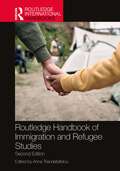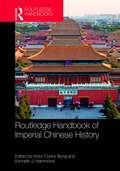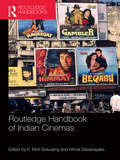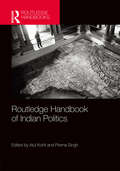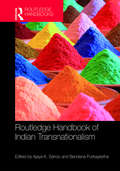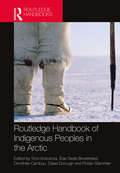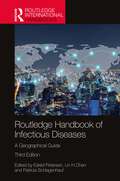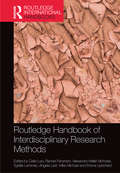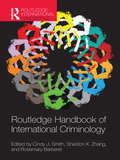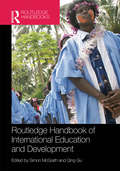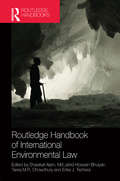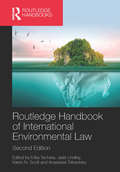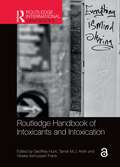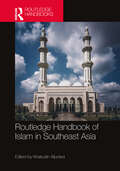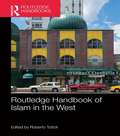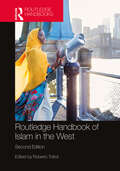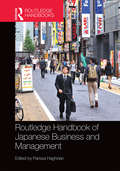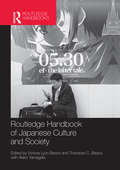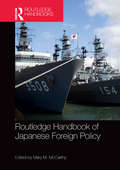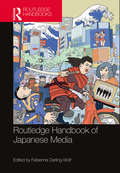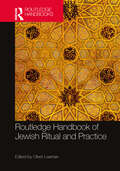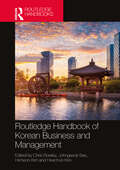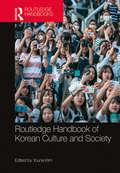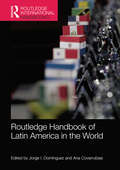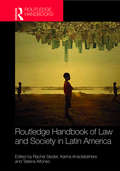- Table View
- List View
Routledge Handbook of Immigration and Refugee Studies (Routledge International Handbooks)
by Anna TriandafyllidouThe Routledge Handbook of Immigration and Refugee Studies offers a comprehensive study of the multi-disciplinary field of international migration and asylum studies. The new edition incorporates numerous new chapters on issues including return migration, the relationship between urbanisation and migration, the role of advanced digital technologies in migration governance, decision making and human agency, and the COVID-19 pandemic and its impact on global migration. Utilising contemporary information and analysis, this innovative Handbook provides an in-depth examination of the major analytical questions pertaining to migration and asylum, whilst discussing key areas such as work, welfare, families, citizenship, the relationship between migration and development, asylum and irregular migration. With a comprehensive collection of essays written by leading contributors from different world regions and covering a broad range of disciplines including sociology, geography, legal studies, political science, and economics, the Handbook is a truly multidisciplinary reader. Organised into thematic and geographical chapters, the Routledge Handbook of Immigration and Refugee Studies provides a concise overview on the different topics and world regions, as well as useful guidance for both the starting and the more experienced reader. The Handbook’s expansive content and illustrative style will appeal to both students and professionals studying in the field of migration and international organisations.
Routledge Handbook of Imperial Chinese History
by Victor Cunrui Xiong Kenneth J. HammondThe resurgence of modern China has generated much interest, not only in the country’s present day activities, but also in its long history. As the only uninterrupted ancient civilization still alive today, the study of China’s past promises to offer invaluable insights into understanding contemporary China. Providing coverage of the entire Imperial Era (221 BCE–1912 CE), this handbook takes a chronological approach. It includes comprehensive analysis of all major periods, from the powerful Han empire which rivalled Rome, and the crucial transformative period of the Five Dynasties, to the prosperous Ming era and the later dominance of the non-Han peoples. With contributions from a team of international authors, key themes include: Political events and leadership Religion and philosophy Cultural and literary achievements Legal, economic, and military institutions This book transcends the traditional boundaries of historiography, giving special attention to the role of archaeology. As such, the Routledge Handbook of Imperial Chinese History is an indispensable reference work for students and scholars of Chinese, Asian, and World History.
Routledge Handbook of Indian Cinemas
by Wimal Dissanayake K. Moti GokulsingIndia is the largest film producing country in the world and its output has a global reach. After years of marginalisation by academics in the Western world, Indian cinemas have moved from the periphery to the centre of the world cinema in a comparatively short space of time. Bringing together contributions from leading scholars in the field, this Handbook looks at the complex reasons for this remarkable journey. Combining a historical and thematic approach, the Handbook discusses how Indian cinemas need to be understood in their historical unfolding as well as their complex relationships to social, economic, cultural, political, ideological, aesthetic, technical and institutional discourses. The thematic section provides an up-to-date critical narrative on diverse topics such as audience, censorship, film distribution, film industry, diaspora, sexuality, film music and nationalism. The Handbook provides a comprehensive and cutting edge survey of Indian cinemas, discussing Popular, Parallel/New Wave and Regional cinemas as well as the spectacular rise of Bollywood. It is an invaluable resource for students and academics of South Asian Studies, Film Studies and Cultural Studies.
Routledge Handbook of Indian Politics
by Atul Kohli Prerna SinghIndia’s growing economic and socio-political importance on the global stage has triggered an increased interest in the country. This Handbook is a reference guide, which surveys the current state of Indian politics and provides a basic understanding of the ways in which the world’s largest democracy functions. The Handbook is structured around four main topics: political change, political economy, the diversity of regional development, and the changing role of India in the world. Chapters examine how and why democracy in India put down firm roots, but also why the quality of governance offered by India’s democracy continues to be low. The acceleration of economic growth since the mid-1980s is discussed, and the Handbook goes on to look at the political and economic changes in selected states, and how progress across Indian states continues to be uneven. It concludes by touching on the issue of India’s international relations, both in South Asia and the wider world. The Handbook offers an invigorating initiation into the seemingly daunting and complex terrain of Indian politics. It is an invaluable resource for academics, researchers, policy analysts, graduate and undergraduate students studying Indian politics.
Routledge Handbook of Indian Transnationalism
by Bandana Purkayastha Ajaya Kumar SahooThis book introduces readers to the many dimensions of historical and contemporary Indian transnationalism and the experiences of migrants and workers to reveal the structures of transnationalism and the ways in which Indian origin groups are affected. The concept of crossing borders emerges as an important theme, along with the interweaving of life in geographic and web spaces. The authors draw from a variety of archives and intellectual perspectives in order to map the narratives of Indian transnationalism and analyse the interplay of culture and structures within transnational contexts. The topics covered range from the history of transnational networks, activism, identity, gender, politics, labour, policy, performance, literature and more. This collection presents a wide array of issues and debates which will reinvigorate discussions about Indian transnationalism. This handbook will be an invaluable resource for academics, researchers, and students interested in studying South Asia in general and the Indian diaspora in particular.
Routledge Handbook of Indigenous Peoples in the Arctic (Routledge International Handbooks)
by Timo Koivurova Dorothée Cambou Else Grete Broderstad Dalee Dorough Florian StammlerThis handbook brings together the expertise of Indigenous and non-Indigenous scholars to offer a comprehensive overview of issues surrounding the well-being, self-determination and sustainability of Indigenous peoples in the Arctic. Offering multidisciplinary insights from leading figures, this handbook highlights Indigenous challenges, approaches and solutions to pressing issues in Arctic regions, such as a warming climate and the loss of biodiversity. It furthers our understanding of the Arctic experience by analyzing how people not only survive but thrive in the planet’s harshest climate through their innovation, ingenuity and agency to tackle rapidly changing environments and evolving political, social, economic and cultural conditions. The book is structured into three distinct parts that cover key topics in recent and future research with Indigenous Peoples in the Arctic. The first part examines the diversity of Indigenous peoples and their cultural expressions in the different Arctic states. It also focuses on the well-being of Indigenous peoples in the Arctic regions. The second part relates to the identities and livelihoods that Indigenous peoples in Arctic regions derive from the resources in their environments. This interconnection between resources and people’s identities underscores their entitlements to use their lands and resources. The third and final part provides insights into the political involvement of Indigenous peoples from local all the way to the international level and their right to self-determination and some of the recent related topics in this field. This book offers a novel contribution to Arctic studies, empowering Indigenous research for the future and rebuilding the image of Indigenous peoples as proactive participants, signaling their pivotal role in the co-production of knowledge. It will appeal to scholars and students of law, political sciences, geography, anthropology, Arctic studies and environmental studies, as well as policy-makers and professionals.
Routledge Handbook of Infectious Diseases: A Geographical Guide
by Eskild Petersen Patricia Schlagenhauf Lin H. ChenThe new edition of this unique resource, grounded on an understanding that our global world is more connected than it has ever been, provides an essential survey of infectious diseases based on both clinical presentation and geographical area of exposure.This book is split into three main sections. The first section offers an overview of the geopolitics of infectious diseases, highlighting the channels through which a disease can spread from one region or country to another, including air travel, shipping or migration. The second section provides a comprehensive overview of each region, highlighting the infectious diseases common to that part of the world. The final section includes a chapter examining new infections of concern, and a chapter discussing infectious diseases in the context of global climate change.Thoroughly updated with the latest clinical data and featuring contributions from leading scholars and clinicians in the field, this book is a timely and important resource for practitioners and scholars across Clinical Medicine, Epidemiology and Public Health.
Routledge Handbook of Interdisciplinary Research Methods (Routledge International Handbooks)
by Alexandra Heller-Nicholas Celia Lury Mike Michael Rachel Fensham Sybille Lammes Angela Last Emma UprichardThe landscape of contemporary research is characterized by growing interdisciplinarity, and disciplinary boundaries are blurring faster than ever. Yet while interdisciplinary methods, and methodological innovation in general, are often presented as the ‘holy grail’ of research, there are few examples or discussions of their development and ‘behaviour’ in the field. This Routledge Handbook of Interdisciplinary Research presents a bold intervention by showcasing a diversity of stimulating approaches. Over 50 experienced researchers illustrate the challenges, but also the rewards of doing and representing interdisciplinary research through their own methodological developments. Featured projects cover a variety of scales and topics, from small art-science collaborations to the ‘big data’ of mass observations. Each section is dedicated to an aspect of data handling, from collection, classification, validation to communication to research audiences. Most importantly, Interdisciplinary Methods presents a distinctive approach through its focus on knowledge as process, defamiliarising and reworking familiar practices such as experimenting, archiving, observing, prototyping or translating.
Routledge Handbook of International Criminology (Routledge International Handbooks)
by Rosemary Barberet Sheldon X. Zhang Cindy J. SmithThe Routledge Handbook of International Criminology brings together the latest thinking and findings from a diverse group of both senior and promising young scholars from around the globe. This collaborative project articulates a new way of thinking about criminology that extends existing perspectives in understanding crime and social control across borders, jurisdictions, and cultures, and facilitates the development of an overarching framework that is truly international. The book is divided into three parts, in which three distinct yet overlapping types of crime are analyzed: international crime, transnational crime, and national crime. Each of these perspectives is then articulated through a number of chapters which cover theory and methods, international and transnational crime analyses, and case studies of criminology and criminal justice in relevant nations. In addition, questions placed at the end of each chapter encourage greater reflection on the issues raised, and will encourage young scholars to move the field of inquiry forward. This handbook is an excellent reference tool for undergraduate and graduate students with particular interests in research methods, international criminology, and making comparisons across countries.
Routledge Handbook of International Education and Development (Routledge International Handbooks)
by Simon McGrath & Qing GuThis timely Handbook takes stock of the range of debates that characterise the field of international education and development, and suggests key aspects of a research agenda for the next period. It is deliberately divergent in its approach, recognising the major ideological and epistemological divides that characterise a field that draws on many traditions. Leading and emergent voices from different paradigms and contexts are afforded a space to be heard and each section puts current debates in larger historical contexts. The Handbook is divided in four parts and book-ended by an introduction and a conclusion, the latter oriented towards the implications that the volume has for future research agendas. The first part explores major strands of debates about education’s place in development theory. The second acknowledges the disciplining of the field by the education for all movement and examines the place that learning and teaching, and schools play in development. Part three looks beyond schools to consider early years, adult and vocational education but focuses particularly on the return to thinking about higher education's role in development. The final part considers the changing, but still important, role that international cooperation plays in shaping education in developing countries. Featuring over thirty chapters written by leading international and interdisciplinary scholars, the Routledge Handbook of International Education and Development offers the first comprehensive and forward-looking resource for students and scholars.
Routledge Handbook of International Environmental Law
by Shawkat Alam Erika J. Techera Md Jahid Hossain Bhuiyan Tareq M.R. ChowdhuryThe Routledge Handbook of International Environmental Law is an advanced level reference guide which provides a comprehensive and contemporary overview of the corpus of international environmental law (IEL). The Handbook features specially commissioned papers by leading experts in the field of international environmental law, drawn from a range of both developed and developing countries in order to put forward a truly global approach to the subject. Furthermore, it addresses emerging and cross-cutting issues of critical importance for the years ahead. The book is split into six parts for ease of reference: The Legal Framework, Theories and Principles of International Environmental Law - focuses on the origins, theory, principles and development of the discipline; Implementing International Environmental Law - addresses the implementation of IEL and the role of various actors and institutions, including corporations, intergovernmental organisations and NGOs; Key Issues and Legal Frameworks - brings fresh perspectives of the common general issues of international environmental law, such as biological diversity and marine environmental law; Regional Environmental Law - explores the specific regimes developed to address regional environmental issues, considering the evolution, prospects and relationship of regional law and mechanisms to IEL; Cross-Cutting Issues - considers the engagement of international environmental law with other key fields and legal regimes, including international trade, human rights and armed conflict; Contemporary and Future Challenges - analyses pressing current and emerging issues in the field including environmental refugees and climate change, REDD and deforestation, and ‘treaty congestion’ in IEL. This up-to-date and authoritative book makes it an essential reference work for students, scholars and practitioners working in the field.
Routledge Handbook of International Environmental Law
by Erika Techera; Jade Lindley; Karen N. Scott; Anastasia TelesetskyThis book critically explores the legal tools, concepts, principles and instruments, as well as cross-cutting issues, that comprise the field of international environmental law. Commencing with foundational elements, progressing on to discrete sub-fields, then exploring regional cooperative approaches, cross-cutting issues and finally emerging challenges for international environmental law, it features chapters by leading experts in the field of international environmental law, drawn from a range of countries in order to put forward a truly global approach to the subject. The book is split into five parts: • The foundations of international environmental law covering the principles of international environmental law, standards and voluntary commitments, sustainable development, issues of public participation and environmental rights and compliance, state responsibility, liability and dispute settlement. • The key instruments and governance arrangements across the most critical areas of international environmental law: biodiversity, wildlife, freshwater, forestry and soils, fisheries, marine pollution, chemicals and waste, air and atmospheric pollution and climate change. • Crucial developments in seven distinct regions of the world: Africa, Europe, North America, Latin America, South East Asia, the polar regions and small island states. • Cross-cutting issues and multidisciplinary developments, drawing from multiple other fields of law and beyond to address human rights and Indigenous rights, war and armed conflict, trade, financing, investment, criminology, technology and energy. • Contemporary challenges and the emerging international environmental law regimes which address these: the changing climate, forced migration, marine plastic debris and future directions in international environmental law. Containing chapters on the most critical developments in environmental law in recent years, this comprehensive and authoritative book makes for an essential reference work for students, scholars and practitioners working in the field.
Routledge Handbook of Intoxicants and Intoxication (Routledge International Handbooks)
by Geoffrey Hunt Vibeke Asmussen Frank Tamar M.J. AntinBringing together scholars from different disciplines in the humanities and social sciences, this multidisciplinary Handbook offers a comprehensive critical overview of intoxicants and intoxication. The Handbook is divided into 34 chapters across eight thematic sections covering a wide range of issues, including the meanings of intoxicants; the social life of intoxicants; intoxication settings; intoxication practices; alternative approaches to the study of intoxication; scapegoated intoxicants; discourses shaping intoxication; and changing notions of excess. It explores a range of different intoxicants, including alcohol, tobacco, coffee, tea, and legal and illicit drugs, including amphetamine, cannabis, ecstasy, khat, methadone, and opiates. Chapter length case studies explore these intoxicants in a variety of countries, including the USA, the UK, Australia, Bosnia & Herzegovina, Brazil, Denmark, Ireland, Japan, Kyrgyzstan, Nigeria, Singapore, and Sweden, across a broad timespan covering the nineteenth century to the present day. This wide-ranging Handbook will be of great interest to researchers, students, and instructors within the humanities and social sciences with an interest in a wide range of different intoxicants and different intoxication practices. Chapters 15 and 31 of this book are freely available as downloadable Open Access PDFs at http://www.taylorfrancis.com under a Creative Commons [Attribution-Non Commercial-No Derivatives (CC-BY-NC-ND)] 4.0 license.
Routledge Handbook of Islam in Southeast Asia
by Khairudin AljuniedThis handbook explores the ways in which Islam, as one of the fastest growing religions, has become a global faith for both Muslims and non-Muslims in Southeast Asia with its universality, inclusivity, and shared features with other Islamic expressions and manifestations. It offers an up-to-date, wide-ranging, comprehensive, concise, and readable introduction to the field of Islam in Southeast Asia. With specific themes of pertinent contemporary relevance, the contributions by experts in the field provide fresh insights into the roles of states, societies, scholars, social movements, political parties, economic institutions, sacred sites, and other forces that structured the faith over many centuries. The handbook is structured in three parts: Muslim Global Circulations Marginal Narratives Refashioning Pieties This handbook stands out as a single and synergistic reference work that explores the ebb and flow of Islam seeking to decenter many existing assumptions about it in Southeast Asia. It will be an indispensable resource for scholars, students, and policymakers working on Islam, Muslims, and their interactions with other communities in a plural setting.
Routledge Handbook of Islam in the West
by Roberto TottoliIslam has long been a part of the West in terms of religion, culture, politics and society. Discussing this interaction from al-Andalus to the present, this Handbook explores the influence Islam has had, and continues to exert; particularly its impact on host societies, culture and politics. Highlighting specific themes and topics in history and culture, chapters cover: European paradigms Muslims in the Americas Cultural interactions Islamic cultural contributions to the Western world Western contributions to Islam Providing a sound historical background, from which a nuanced overview of Islam and Western society can be built, the Routledge Handbook of Islam in the West brings to the fore specific themes and topics that have generated both reciprocal influence, and conflict. Presenting readers with a range of perspectives from scholars based in Europe, the US, and the Middle East, this Handbook challenges perceptions on both western and Muslim sides and will be an invaluable resource for policymakers and academics with an interest in the History of Islam, Religion and the contemporary relationship between Islam and the West.
Routledge Handbook of Islam in the West
by Roberto TottoliWith new topics and contributions, this updated second edition discusses the history and contemporary presence of Islam in Europe and America. The book debates the relevance and multi-faceted participation of Muslims in the dynamics of Western societies, challenging the changing perception on both sides. Collating over 30 chapters, written by experts from around the world, the volume presents a wide range of perspectives. Case studies from the Muslim presence in the Iberian Peninsula between the Middle Ages and the modern age set off the Handbook, along with an outline of Muslims in America up to the twentieth century. The second part covers concepts around new conditions in terms of consolidating identities, the emergence of new Muslim actors, the appearance of institutions and institutional attitudes, the effects of Islamic presence on the arts and landscapes of the West, and the relational dynamics like ethics and gender. Exploring the influence of Islam, particularly its impact on society, culture and politics, this interdisciplinary volume is a key resource for policymakers, academics and students interested in the history of Islam, religion and the contemporary relationship between Islam and the West.
Routledge Handbook of Japanese Business and Management
by Parissa HaghirianThe Routledge Handbook of Japanese Business and Management provides a comprehensive overview of management and business processes and practices in Japanese companies. The contributors combine theoretical findings and research results with a practical and contemporary view on how corporations and firms are managed in Japan. The handbook is divided into eight sections covering: historical perspectives on Japanese management; structure and theory of the Japanese firm; the corporate environment in Japan; the Japanese work environment; the Japanese market; manufacturing and logistics; interaction and communication; the future of Japanese management. This book is an essential reference resource for students and scholars working on Japanese companies, the Japanese market-place, Japanese consumers, or management processes in the Japanese firm. The book also provides an interesting and informative read for managers who need to deepen their knowledge on Japanese business processes.
Routledge Handbook of Japanese Culture and Society
by Theodore C. Bestor Edited by Victoria Lyon Bestor Akiko YamagataThe Routledge Handbook of Japanese Culture and Society is an interdisciplinary resource that focuses on contemporary Japan and the social and cultural trends that are important at the beginning of the twenty-first century. This Handbook provides a cutting-edge and comprehensive survey of significant phenomena, institutions, and directions in Japan today, on issues ranging from gender and family, the environment, race and ethnicity, and urban life, to popular culture and electronic media. Written by an international team of Japan experts, the chapters included in the volume form an accessible and fascinating insight into Japanese culture and society. As such, the Handbook will be an invaluable reference tool for anyone interested in all things Japanese. Students, teachers and professionals alike will benefit from the broad ranging discussions, useful links to online resources and suggested reading lists. The Handbook will be of interest across a wide range of disciplines including Japanese Studies, Cultural Studies, Anthropology, Sociology and Asian Studies in general.
Routledge Handbook of Japanese Foreign Policy
by Mary M. McCarthyFrom a nuclear North Korea and territorial disputes in the East China Sea, to global climate change and Asia-Pacific free trade agreements, Japan is at the center of some of the most challenging issues that the world faces today. Taking an interdisciplinary approach, comprising contributions from the fields of politics, sociology, history, and gender studies, this handbook creates a comprehensive and innovative overview of the field, investigating the widening variety of interests, sometimes competing, that constitute Japanese foreign policy. Organized topically, it is divided into sections, including: • Japan’s evolving foreign policy landscape • Global environmental and sustainable development • International and national security • International political economy • International norms and civil society. Providing an evaluation of the key actors, institutions, and networks influencing Japanese foreign policy, the Routledge Handbook of Japanese Foreign Policy is an essential resource for students and scholars of Japanese and Asian Politics, International Relations, and Foreign Policy.
Routledge Handbook of Japanese Media
by Fabienne Darling-WolfThe Routledge Handbook of Japanese Media is a comprehensive study of the key contemporary issues and scholarly discussions around Japanese media. Covering a wide variety of forms and types from newspapers, television and fi lm, to music, manga and social media, this book examines the role of the media in shaping Japanese society from the Meiji era’s intense engagement with Western culture to our current period of rapid digital innovation. Featuring the work of an international team of scholars, the handbook is divided into five thematic sections: The historical background of the Japanese media from the Meiji Restoration to the immediate postwar era. Japan’s national and political identity imagined and negotiated through diff erent aspects of the media, including Japan’s ‘lost decade’ of the 1990s and today’s ‘post- Fukushima’ society. The representation of Japanese identities, including race, gender and sexuality, in contemporary media. The role of Japanese media in everyday life. The Japanese media in a broader global context. Taking an interdisciplinary approach, this book will be of use to students and scholars of Japanese culture and society, Asian media and Japanese popular culture.
Routledge Handbook of Jewish Ritual and Practice
by Oliver LeamanRitual and practice are some of the most defining features of religion, linked with its central beliefs. Discussing the wide range of Jewish ritual and practice, this volume provides a contemporary guide to this significant aspect of religious life and experience. Drawing on a wide range of disciplines, this volume describes not only what takes place, but the reasons behind this and the implications both the theory and practice have for our understanding of Judaism. Organized in terms of texts, periods, practices, languages and relationships with the other, the book includes accounts of prayer, food, history, synagogues and the various legal and ideological debates that exist within Judaism with the focus on how they influence practice. Coming at a time of renewed interest in the role of the body in religion, this book aims to bring the theoretical and scriptural issues which arise in this area of Jewish life and culture up to date. This volume is aimed at students and researchers working in Jewish studies specifically, and religious studies in general. Designed to be helpful to those on courses in relevant areas, especially in the United States, this book includes substantial bibliographical material.
Routledge Handbook of Korean Business and Management
by Chris Rowley Johngseok Bae , Hicheon Kim and Heechun KimThis Handbook, authored by a stellar line-up of international contributors, explores the diverse phenomena and issues surrounding the Korean business and management world.Offering insights into trends, challenges, policies and initiatives of corporations and government and providing a nuanced portrayal of Korean business dynamics, the Handbook’s approach is centred around four key themes: Examining the roles played by the government and markets, including labour and financial markets, in Korea’s economic progression. Addressing macro and micro issues in Korean business and management such as business groups, business-government relationships, corporate governance, corporate strategy and globalization, human resource management, employment relations, and chief executive officer (CEO) compensation. Scrutinizing current phenomena by bridging the past and future, exploring mainstream and emerging business issues such as corporate social responsibility, environmental, social, and governance issues, start-up businesses, diversity and inclusion and the impact of the Fourth Industrial Revolution. Emphasizing the interplay between agents, structures and institutions. Delving into the intricacies of business and management in a Korean context, this Handbook will be a valuable resource to students and scholars of international business and management, with a particular focus on Asia and Korea.
Routledge Handbook of Korean Culture and Society
by Youna KimThe Routledge Handbook of Korean Culture and Society is an accessible and interdisciplinary resource that explores the formation and transformation of Korean culture and society. Each chapter provides a comprehensive and thought-provoking overview on key topics, including: compressed modernity, religion, educational migration, social class and inequality, popular culture, digitalisation, diasporic cultures and cosmopolitanism. These topics are thoroughly explored by an international team of Korea experts, who provide historical context, examine key issues and debates, and highlight emerging questions in order to set the research agenda for the near future. Providing an interdisciplinary overview of Korean culture and society, this Handbook is an essential read for undergraduate and postgraduate students, as well scholars in Korean Studies, Cultural Studies, Sociology, Anthropology, and Asian Studies in general.
Routledge Handbook of Latin America in the World
by Jorge I. Domínguez and Ana CovarrubiasThe Handbook of Latin America in the World explains how the Latin American countries have both reacted and contributed to changing international dynamics over the last 30 years. It provides a comprehensive picture of Latin America’s global engagement by looking at specific processes and issues that link governments and other actors, social and economic, within the region and beyond. Leading scholars offer an up-to-date state of the field, theoretically and empirically, thus avoiding a narrow descriptive approach. The Handbook includes a section on theoretical approaches that analyze Latin America’s place in the international political and economic system and its foreign policy making. Other sections focus on the main countries, actors, and issues in Latin America’s international relations. In so doing, the book sheds light on the complexity of the international relations of selected countries, and on their efforts to act multilaterally. The Routledge Handbook of Latin America in the World is a must-have reference for academics, researchers, and students in the fields of Latin American politics, international relations, and area specialists of all regions of the world.
Routledge Handbook of Law and Society in Latin America
by Rachel Sieder Karina Ansolabehere Tatiana A. Alfonso SierraAn understanding of law and its efficacy in Latin America demands concepts distinct from the hegemonic notions of "rule of law" which have dominated debates on law, politics and society, and that recognize the diversity of situations and contexts characterizing the region. The Routledge Handbook of Law and Society in Latin America presents cutting-edge analysis of the central theoretical and applied areas of enquiry in socio-legal studies in the region by leading figures in the study of law and society from Latin America, North America and Europe. Contributors argue that scholarship about Latin America has made vital contributions to longstanding and emerging theoretical and methodological debates on the relationship between law and society. Key topics examined include: The gap between law-on-the-books and law in action The implications of legal pluralism and legal globalization The legacies of experiences of transitional justice Emerging forms of socio-legal and political mobilization Debates concerning the relationship between the legal and the illegal. The Routledge Handbook of Law and Society in Latin America sets out new research agendas for cross-disciplinary socio-legal studies and will be of interest to those studying law, sociology of law, comparative Latin American politics, legal anthropology and development studies.
